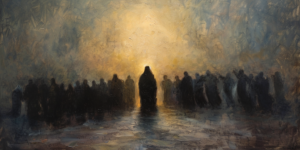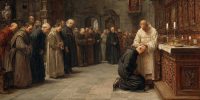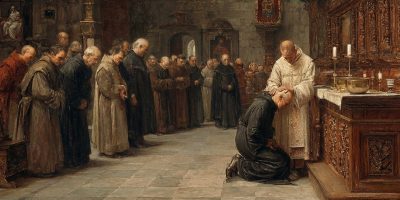Our nation feels divided and our political poles continue in their increasingly antagonistic attacks toward each other. Each side feels that they are right and, therefore, feels justified in their contentious speaking and attacks.
Certainly, I am not saying that we should not stand for truth. However, generally speaking, we tend to focus on how other perspectives are wrong rather than critically thinking about our own perspectives. We can be open to differing views—even if it is just developing an understanding and compassion for those views rather than adopting them.
Rather than listening to each side in an active way to understand, we are listening to each side in order to respond. This type of attitude is precisely the kind that leads to disconnection and misunderstanding. Instead of the conservative sector being viewed as having concerns about their way of life and religious beliefs being threatened, they are seen as bigots who are intolerant and unloving. Instead of more progressive crowds being viewed as wanting to increase belonging and inclusiveness, they are seen as brainwashing tyrants who want to control the narrative. I am not saying that such people do not exist, but broadly painting general populations of people never did anyone any good. We are dehumanizing each other to feel more justified.
Blame is the lie by which we convince ourselves that we are victims. It is the lie that robs us of our serenity, our generosity, our confidence, and our delight in life … For it is the act of blaming that can’t coexist with self-responsibility—or with freedom from inner agitation and strained relationships.
Instead of being individual people with individual views, the progressive or conservative becomes an antagonist in someone’s story. This antagonist then becomes someone to blame for another’s anger and attitude. In such scenarios, we are merely responding to each other in defensive and dehumanizing ways.
Is there a path out, or are we in a reinforcing death spiral that can only result in collapse?
Though I often feel helpless, I am reminded of the book The Silence of God by Gale Sears. It is about the only Latter-day Saint family in Russia at the time of the Bolshevik revolution, a time also fraught with political unrest. A father tells his daughter, “There must be a change of a man’s heart, and only God can do that.”
If we are to avoid the worst outcome of our political polarization, there must be a change of heart. That change of heart comes from God. Ultimately, our nation needs the gospel of Jesus Christ.
Only God Can Change Hearts
My prescription might be easy to dismiss. After all, if all of us began with the foundation of the gospel of Jesus Christ, there would be much less contention in many arenas. Additionally, it might seem odd to suggest that the way to end division is to impose a worldview that half the country finds very divisive.

So let me be more clear. We need Christians to actually be Christians. That is the path to breaking the spiral. We need those who know better to live the gospel of peace, the gospel of accountability, the gospel of forgiveness, the gospel of belonging, and the gospel of compassion.
This does not mean we must cede ground on important matters of our political priorities. But it does mean we must see those who oppose those priorities through the lens of our Savior, Jesus Christ.
We can recognize that humility and goodness come from internal reflection first.
In a conference address, then-President Uchtdorf gave an incredibly insightful commentary on the Last Supper, which I feel we can apply here. He said:
It was our beloved Savior’s final night in mortality, the evening before He would offer Himself a ransom for all mankind. As He broke bread with His disciples, He said something that must have filled their hearts with great alarm and deep sadness. “One of you shall betray me,” He told them.
The disciples didn’t question the truth of what He said. Nor did they look around, point to someone else, and ask, “Is it him?”
Instead, “they were exceeding sorrowful, and began every one of them to say unto him, Lord, is it I?”
… In these simple words, “Lord, is it I?” lies the beginning of wisdom and the pathway to personal conversion and lasting change.
We can benefit from this scriptural account because we can recognize that humility and goodness come from internal reflection first.
I have long loved Independence Day. My family includes many veterans, and my family environment inculcated a love and respect for our country.
But to save our country, we must respect that not everyone has had the same experience. And that is okay. Not everyone needs to feel the exact same way. The fact is that policies of the United States have hurt many people.
I mean, let’s be honest here. As members of The Church of Jesus Christ of Latter-day Saints, we are not oblivious to the harm that this country did to our own members in the 1800s. Our forebears literally left the United States to seek refuge in Utah to remove themselves from the severe persecution they faced. We, of all people, should understand. We need Christians to actually be Christians.
The gospel of Jesus Christ can create a sense of belonging, not just by giving those who share belief in it a unifying feature but by educating our behavior in how we interact with those around us. Ezra Taft Benson, a former President of The Church of Jesus Christ of Latter-day Saints, taught:
Only the gospel will save the world from the calamity of its own self-destruction. Only the gospel will unite men of all races and nationalities in peace. Only the gospel will bring joy, happiness, and salvation to the human family.
Regardless of our political affiliations, Jesus Christ and His gospel are the way to achieve unity and have a society that can exist in peace. This is, perhaps, the attitude we can have as we approach healing the gaping wounds that have been inflicted in this country.

















